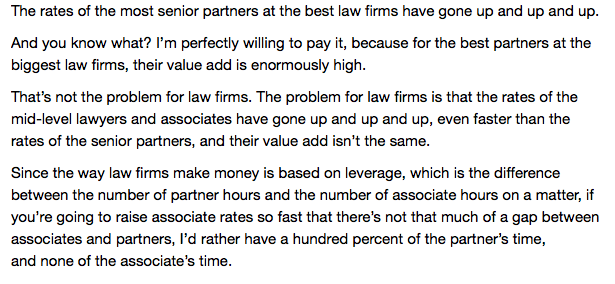Law Firm Associate Billings Rates Are Core Element in Law Firm Economic Difficulties
Brian Brooks, General Counsel of Fannie Mae and previously GC of OneWest Bank and a managing partner of O’Melveny & Myers, was interviewed by Bloomberg’s Big Law Business about the law firm structure. In “Fannie Mae GC: The Law Firm Profit Structure Is Broken,” Brooks explains how the law firm profit model simply doesn't work and ways in which it should be revised--predominately by "dramatically" reducing the billing rates of associates. The alternative, Brooks argues, is that companies will forgo law firms in favor of bringing more and more work in-house.
The fundamental problem, Brooks argues, is:
The problem isn't the selection and retention of top-notch partners--lawyers who are the best of the best at what they do. Rather, is the attorneys staffing the matters and their billing rates:
These super-high rates for service partners and associates (Brooks cites the amour of $700 / hr for a mid-level associate as an example) is why I know of several Big Law attorneys who left their firms. By cutting out the middle-man--the law firm itself - those lawyers credibly argued they could offer BigLaw expertise and a lower rate. At the end of the year, they had charged the client substantially less, while earning substantially more themselves. In one case, the lawyer nearly doubled his personal earnings, while at the same time saving the client money. It as a win-win for everyone except the law firm.
But back to Brooks... because of the high rates for associates, more and more companies are refusing to pay anything for entry-level associates. So he concludes law firms "can’t raise partner rates and associate rates in tandem, because the value proposition for those two kinds of people is different."
Unless rates are corrected, he suggests we'll continue to see "significant numbers of law firms" that are "failing or retrenching or consolidating." And, of course, attorney job prospects alongside with them.



